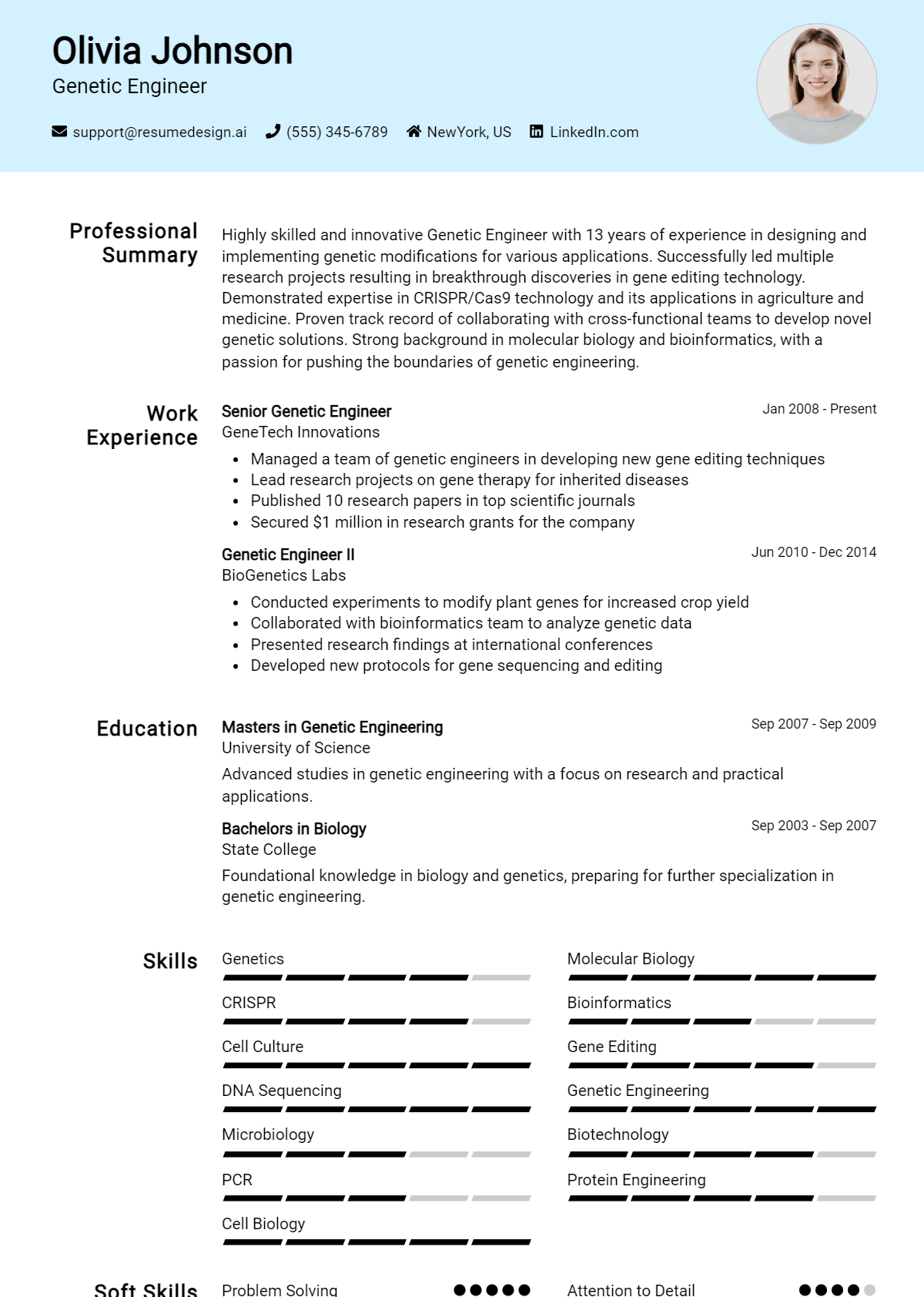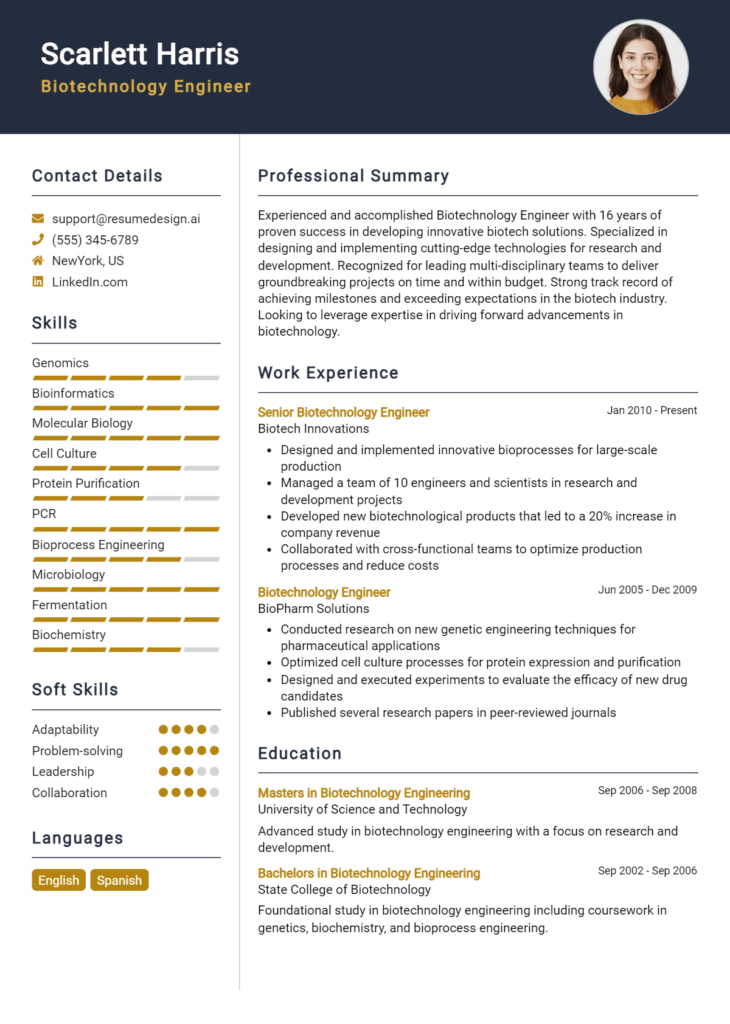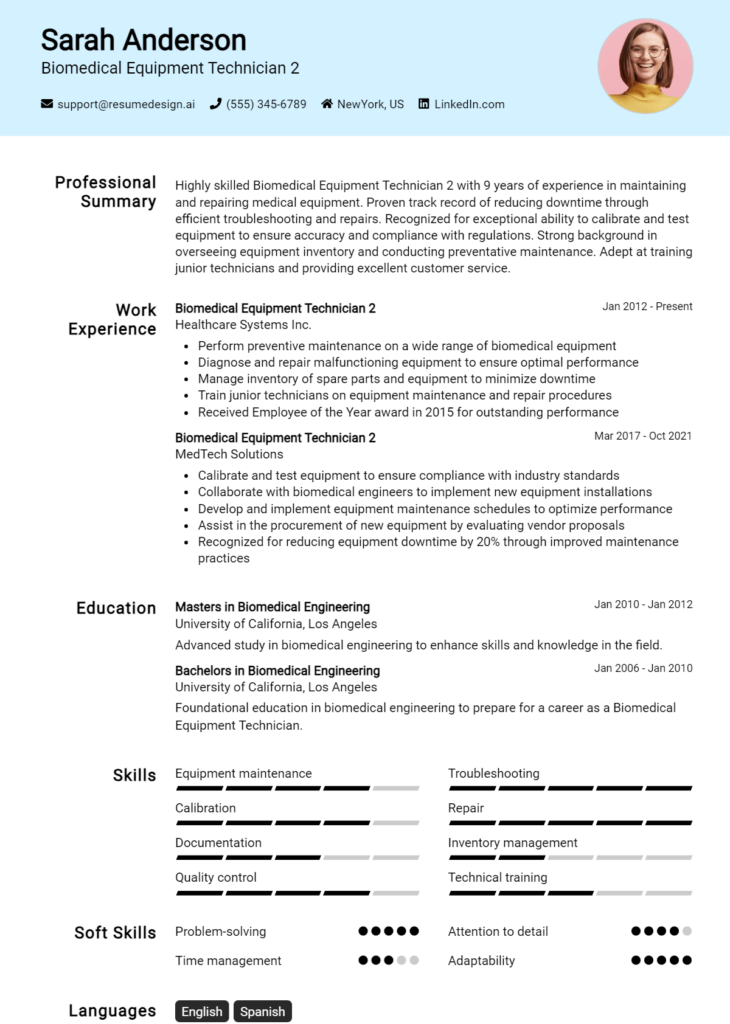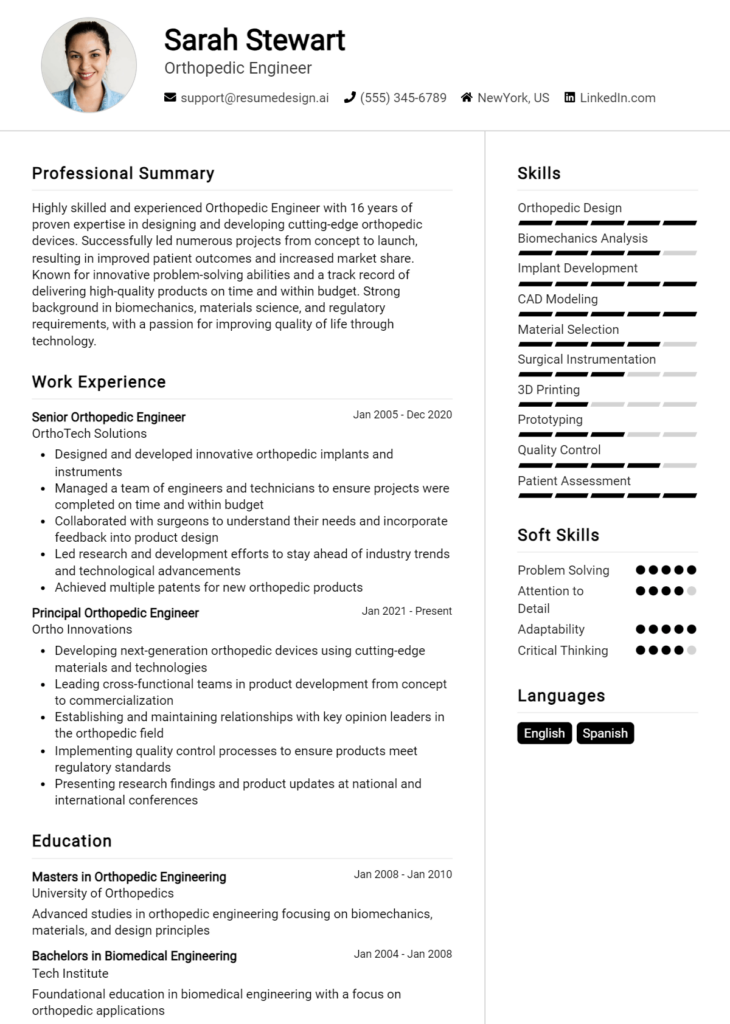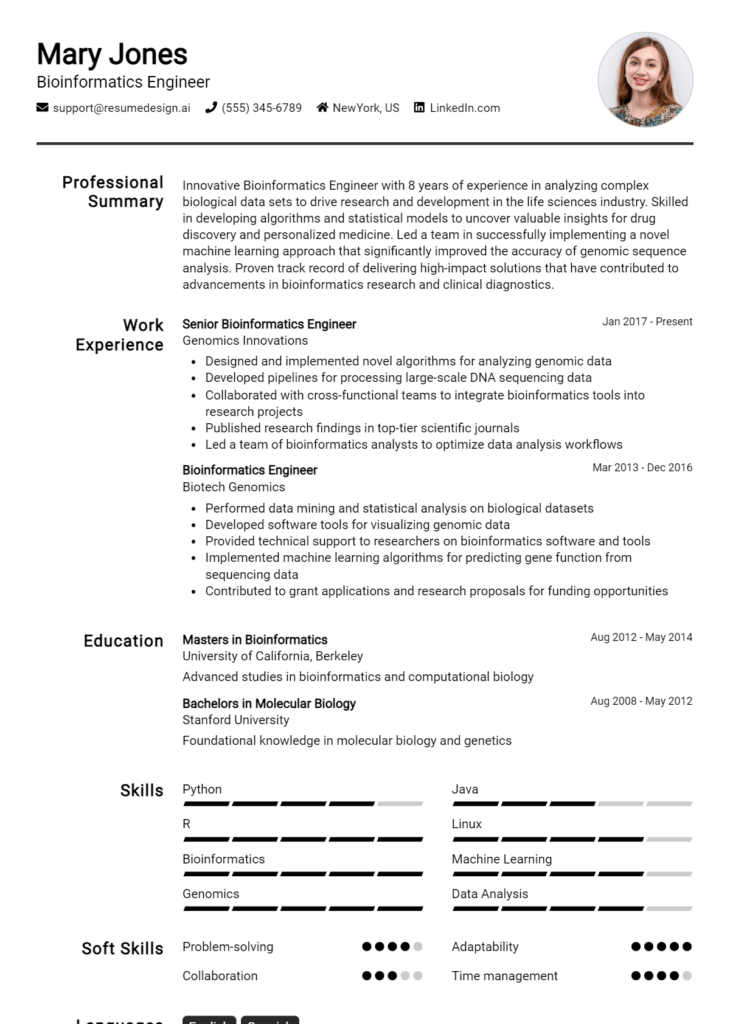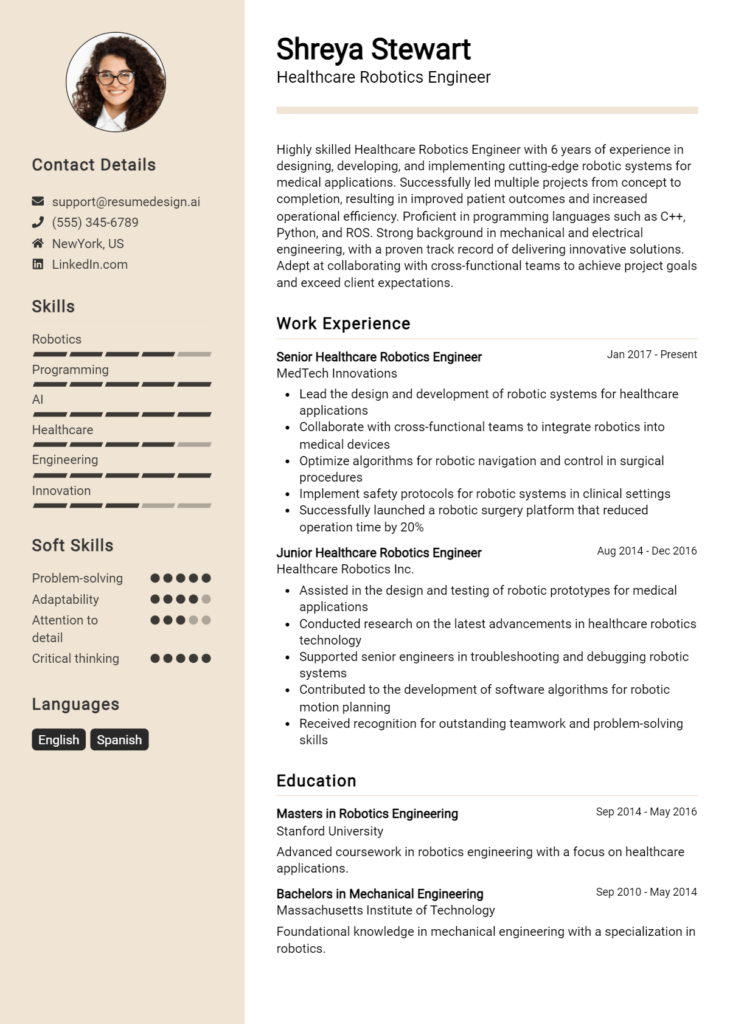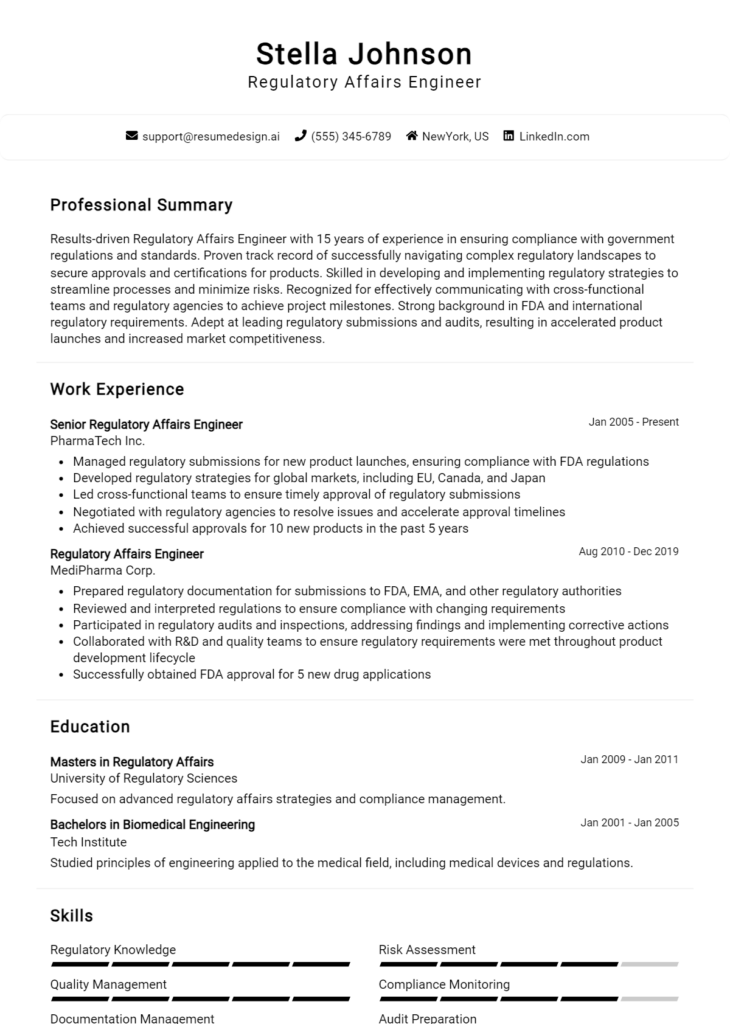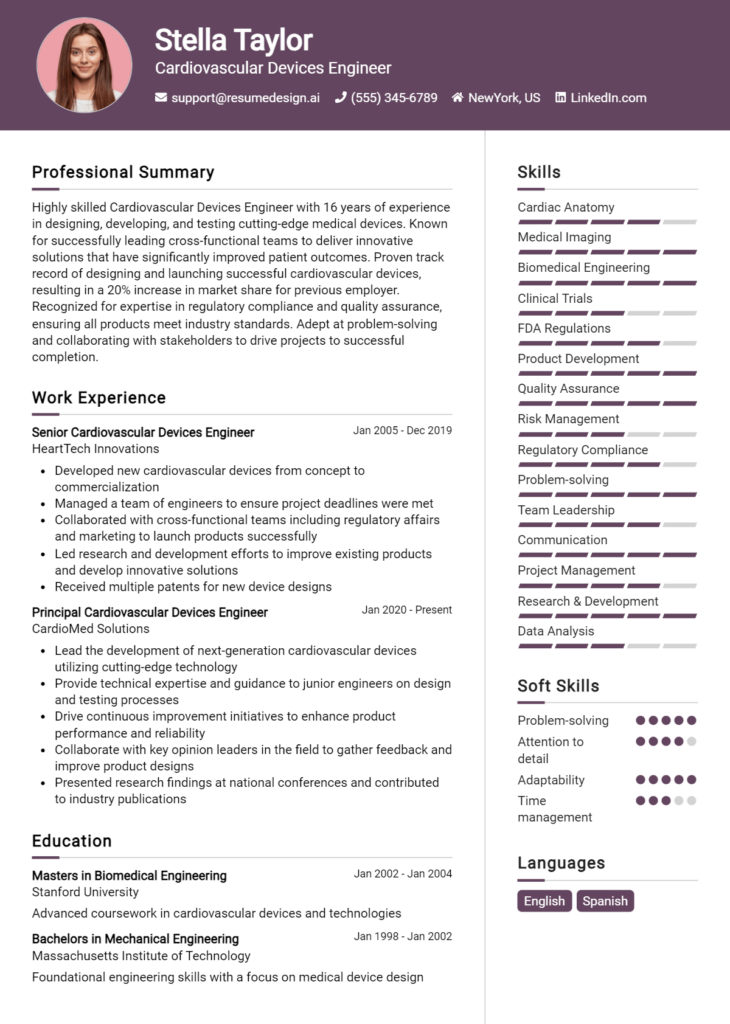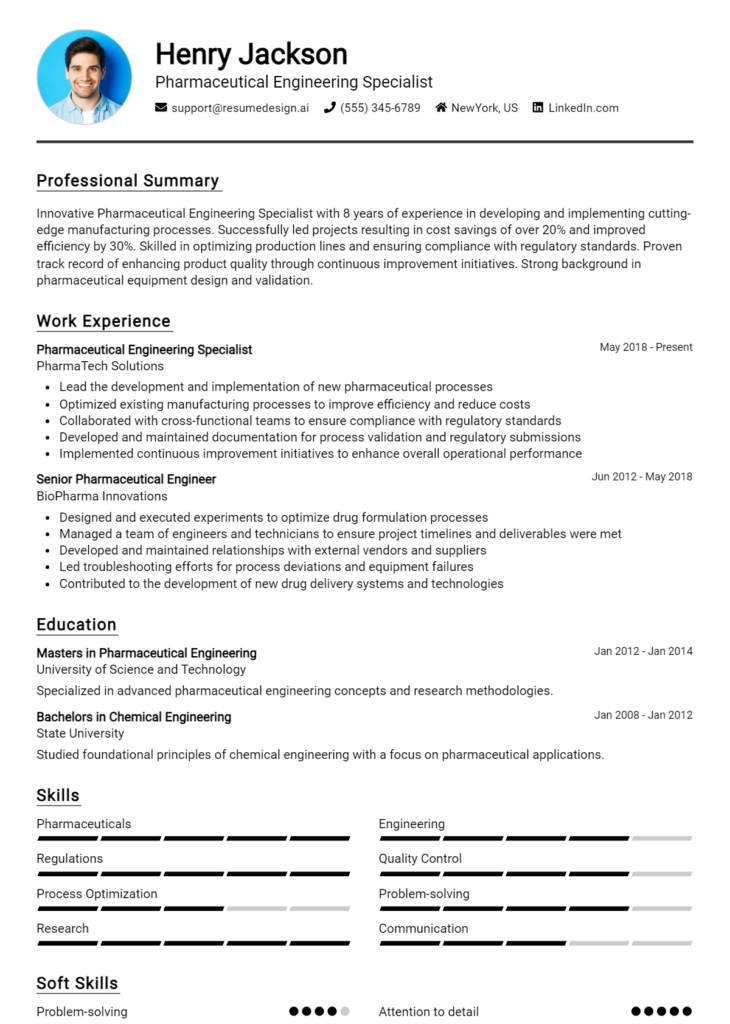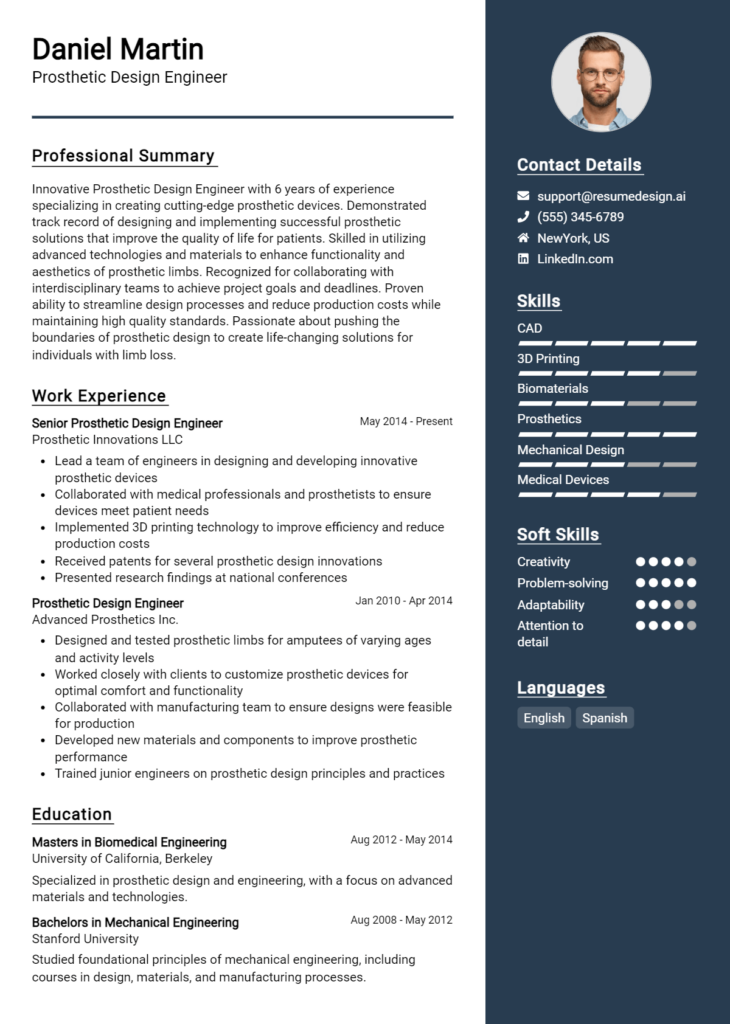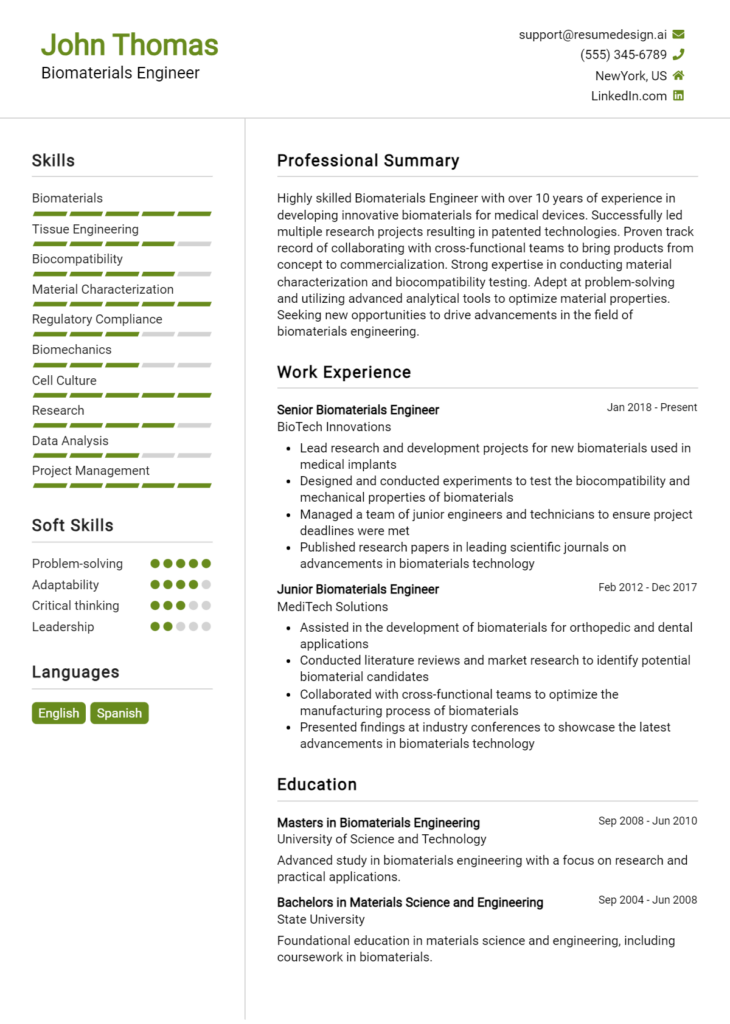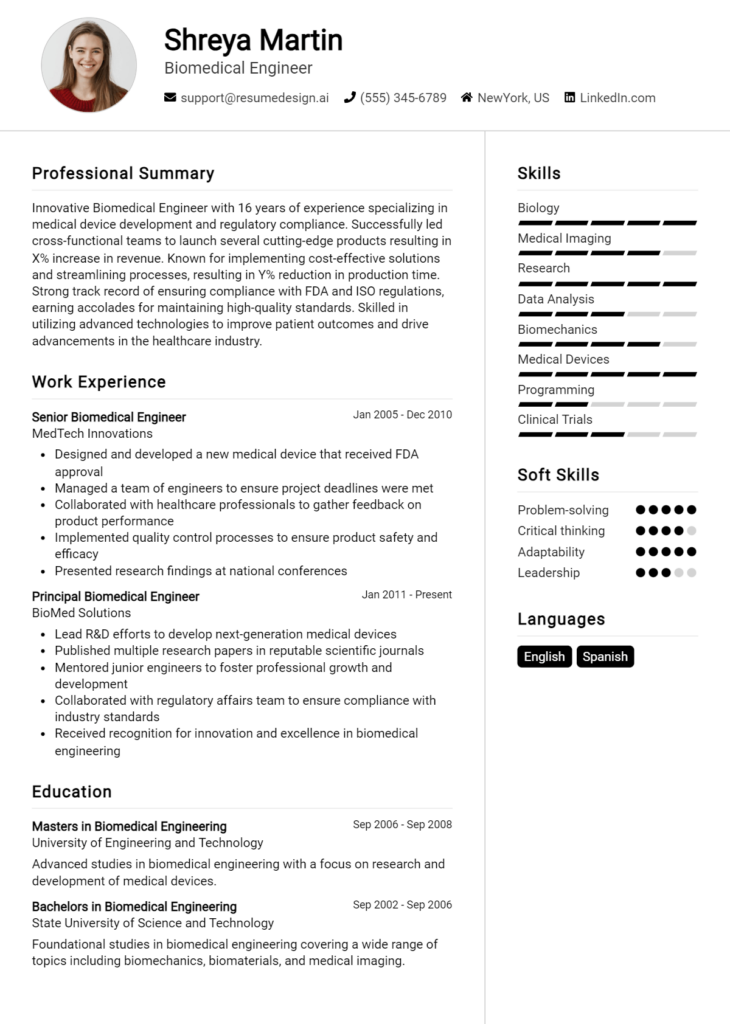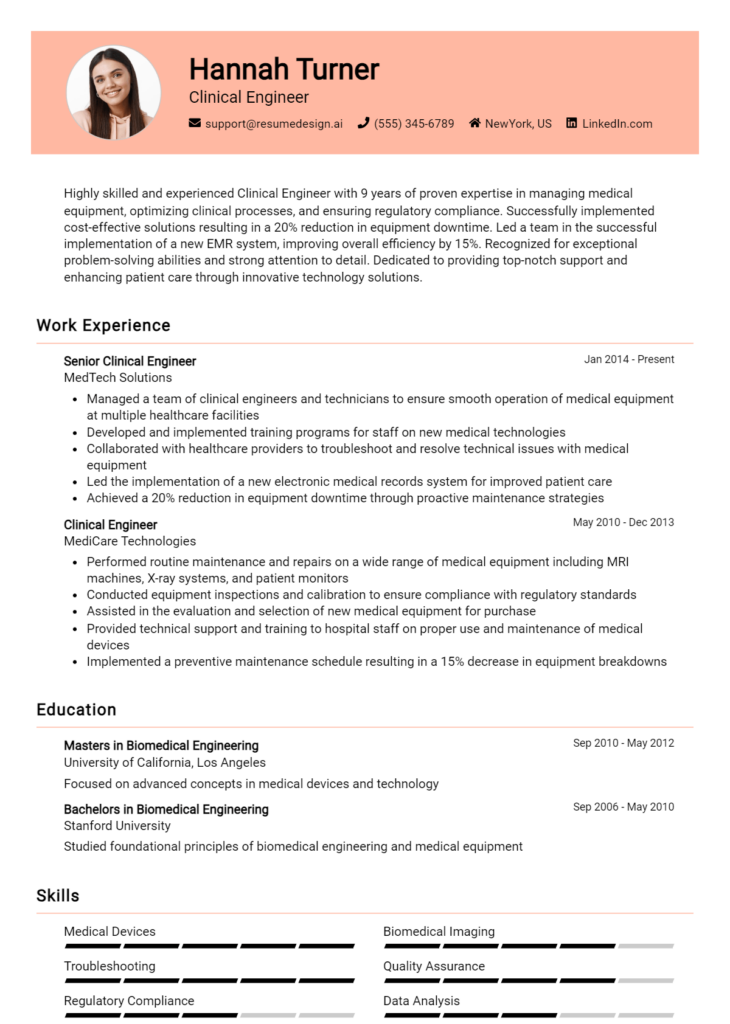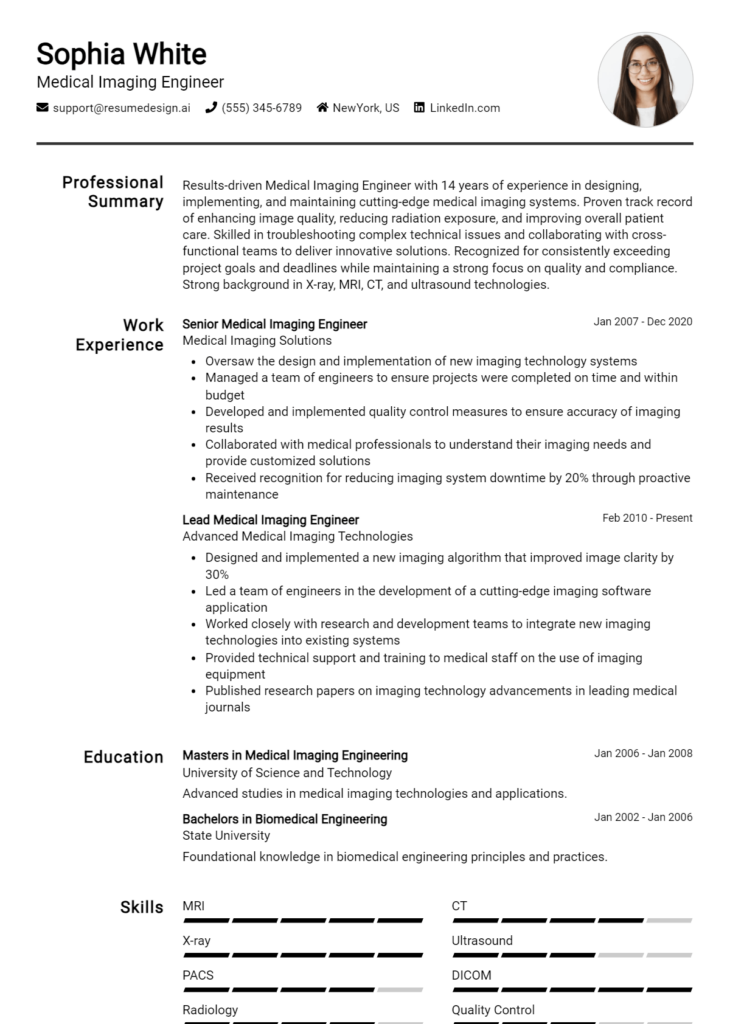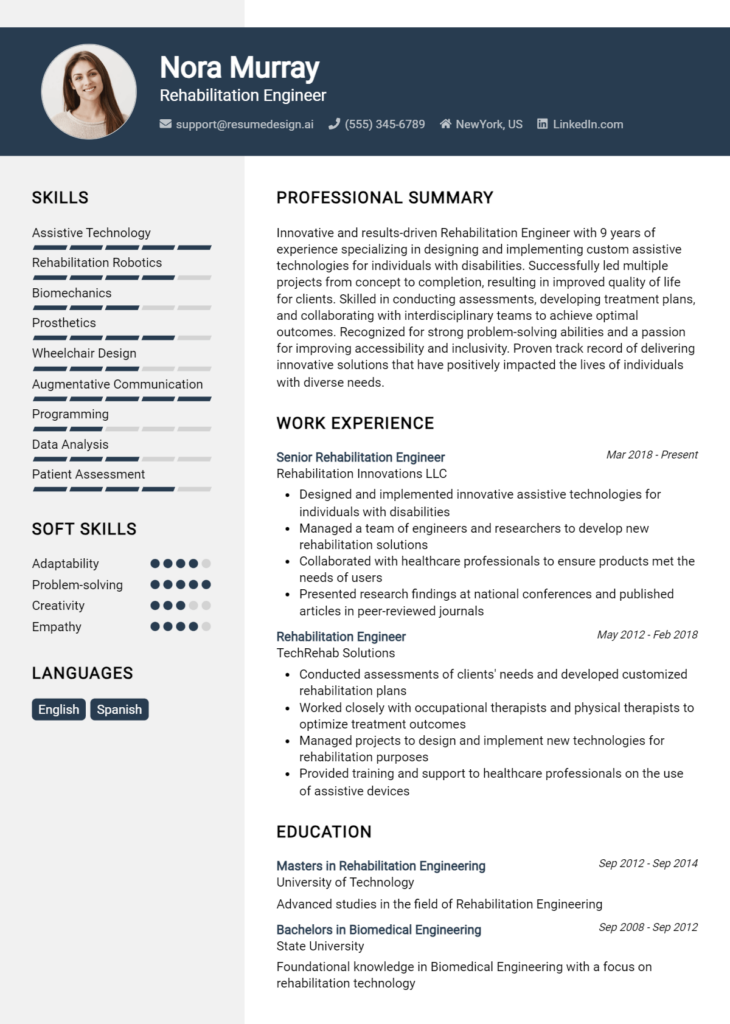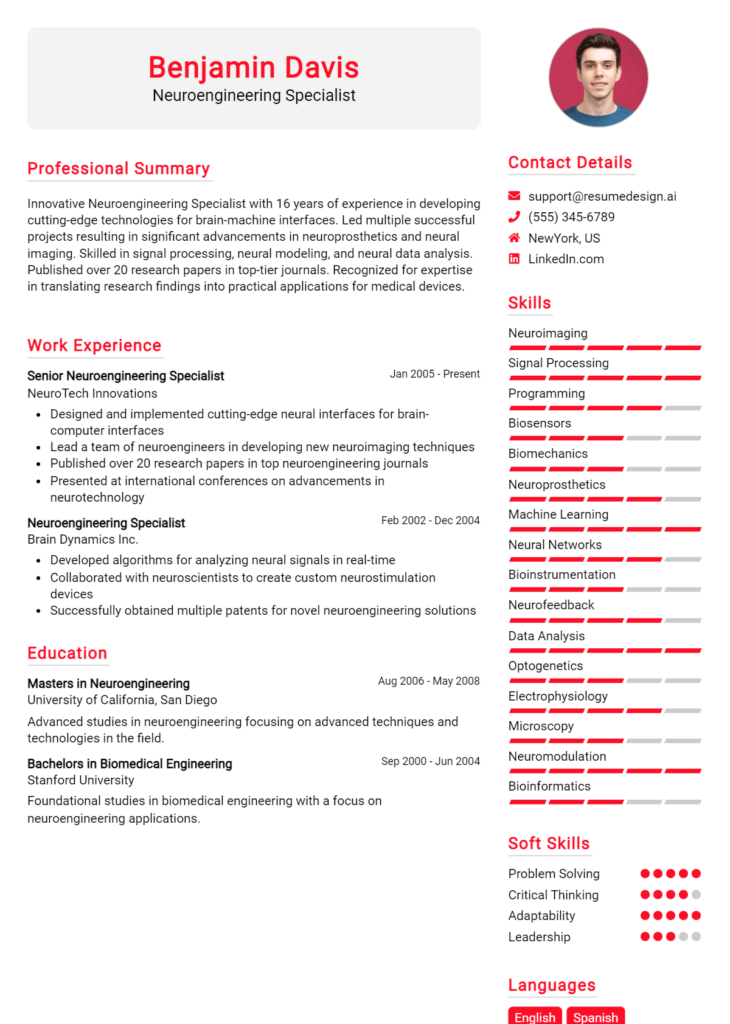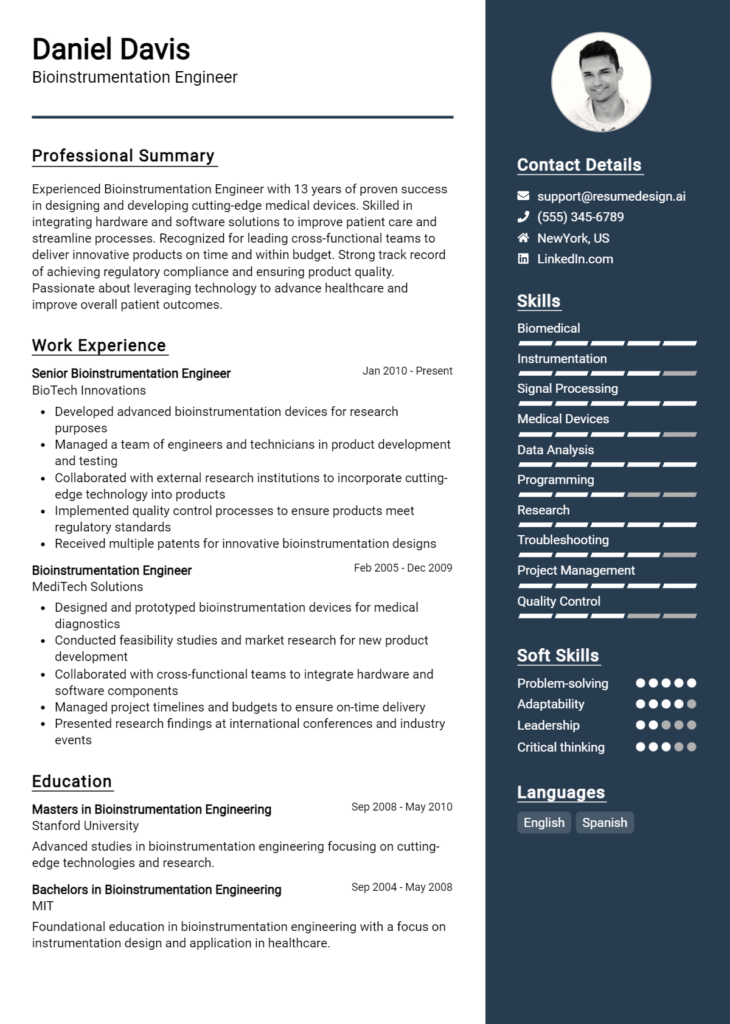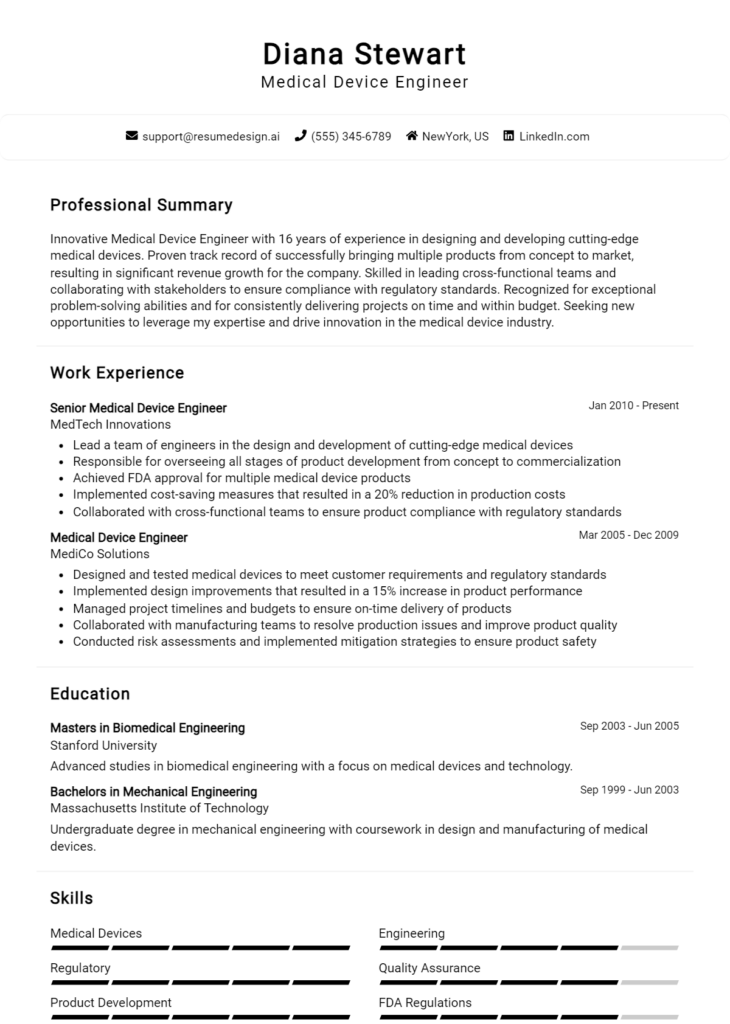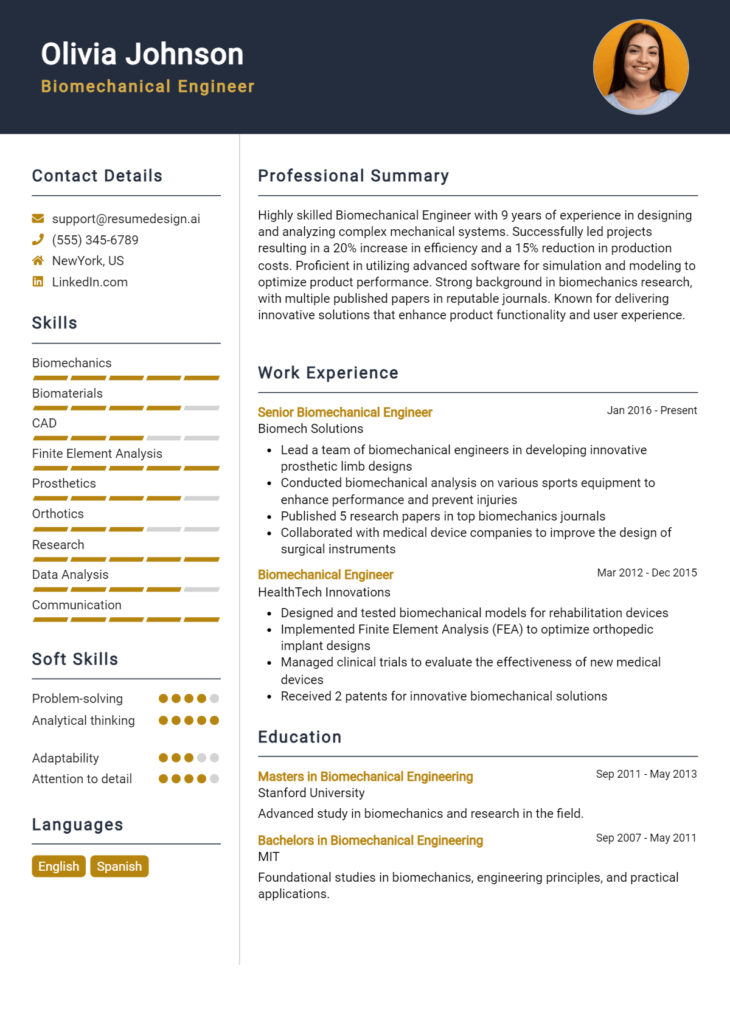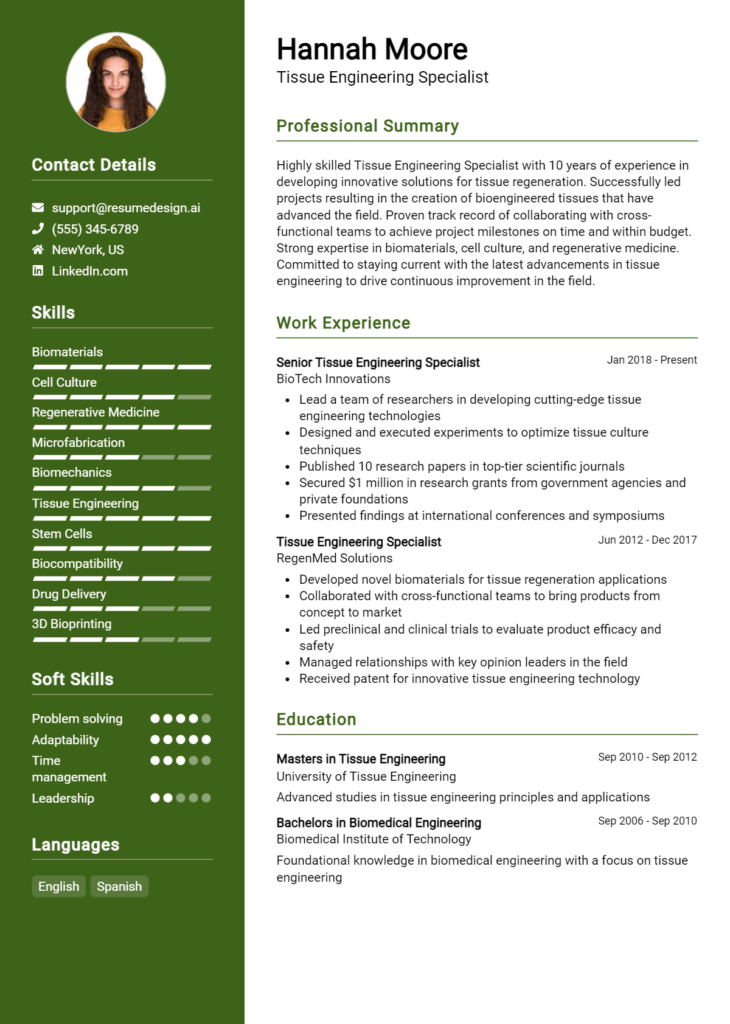Genetic Engineer Core Responsibilities
Genetic Engineers play a vital role in advancing biotechnology by designing and modifying genes to enhance traits in organisms. They collaborate across various departments, including research, development, and quality control, requiring a blend of technical expertise, operational efficiency, and strong problem-solving abilities. Their skills are crucial for meeting organizational goals, ensuring compliance with regulations, and driving innovation. A well-structured resume can effectively showcase these qualifications, demonstrating a candidate's readiness to contribute significantly to their field.
Common Responsibilities Listed on Genetic Engineer Resume
- Design and conduct experiments to modify genetic material.
- Analyze genetic data using bioinformatics tools.
- Collaborate with cross-functional teams on research projects.
- Develop protocols for gene editing and manipulation.
- Ensure compliance with ethical and regulatory standards.
- Document and report findings to stakeholders.
- Optimize laboratory processes for efficiency and accuracy.
- Stay updated on advancements in genetic engineering technologies.
- Train and mentor junior staff in genetic techniques.
- Participate in grant writing and project proposals.
High-Level Resume Tips for Genetic Engineer Professionals
In the competitive field of genetic engineering, a well-crafted resume is essential for making a lasting impression on potential employers. This document often serves as the first point of contact between job seekers and hiring managers, making it crucial to showcase not only technical skills but also significant achievements in the field. A resume that effectively highlights your expertise in genetic modification, molecular biology, and related technologies can set you apart from other candidates. In this guide, we will provide practical and actionable resume tips specifically tailored for genetic engineer professionals, helping you to present your qualifications in the best possible light.
Top Resume Tips for Genetic Engineer Professionals
- Tailor your resume to every job description by incorporating relevant keywords and phrases.
- Showcase your relevant experience, emphasizing internships, research projects, and positions that relate directly to genetic engineering.
- Quantify your achievements by including specific metrics, such as the number of successful projects completed or improvements made to processes.
- Highlight industry-specific skills, including proficiency in CRISPR technology, bioinformatics tools, and genetic sequencing methods.
- Include a summary statement at the top of your resume that encapsulates your expertise and career goals in genetic engineering.
- Use action verbs to describe your responsibilities and accomplishments, making your contributions clear and impactful.
- Incorporate relevant certifications and training, showcasing your commitment to staying current in the field.
- Keep your resume organized and visually appealing, using clear headings and bullet points for easy readability.
- Consider adding a section for publications or presentations, as these can demonstrate your engagement with the scientific community.
By implementing these tips, you can significantly increase your chances of landing a job in the genetic engineering field. A well-structured resume that highlights your skills, achievements, and relevant experiences will not only grab the attention of hiring managers but also position you as a strong candidate in this innovative and rapidly evolving industry.
Why Resume Headlines & Titles are Important for Genetic Engineer
In the competitive field of genetic engineering, the first impression a candidate makes often comes from their resume headline or title. A strong headline is essential as it acts as a hook to grab the attention of hiring managers while summarizing key qualifications in a concise manner. It should reflect the candidate's relevant skills and experiences, directly aligning with the job they are applying for. By crafting an impactful resume title, a genetic engineer can effectively communicate their value proposition, making it easier for employers to identify them as a suitable candidate for the role.
Best Practices for Crafting Resume Headlines for Genetic Engineer
- Keep it concise: Aim for a headline that is no longer than 10 words.
- Be role-specific: Tailor the headline to the specific position you are applying for.
- Highlight key skills: Include critical skills or qualifications that are relevant to genetic engineering.
- Use impactful language: Choose strong, action-oriented words that convey confidence and expertise.
- Incorporate relevant certifications: Mention any relevant certifications or degrees that enhance your qualifications.
- Avoid jargon: Use clear and straightforward language to ensure understanding by all readers.
- Showcase accomplishments: If possible, hint at notable achievements or contributions in previous roles.
- Update regularly: Revise your headline for each application to keep it fresh and relevant.
Example Resume Headlines for Genetic Engineer
Strong Resume Headlines
Innovative Genetic Engineer Specializing in CRISPR Technology
Experienced Geneticist with a Track Record in Gene Therapy
Results-Driven Genetic Engineer Focused on Biotechnology Solutions
Weak Resume Headlines
Genetic Engineer Looking for Work
Science Professional with Some Experience
Strong resume headlines are effective because they immediately convey specific skills and experiences relevant to the genetic engineering field, making the candidate stand out in a crowded applicant pool. They capture the essence of the individual’s professional identity and achievements, thus enticing hiring managers to learn more. Conversely, weak headlines lack specificity and fail to convey any substantial information about the candidate's qualifications, rendering them forgettable and ineffective in making a positive impression.
Writing an Exceptional Genetic Engineer Resume Summary
A well-crafted resume summary is a critical component for a Genetic Engineer seeking to make a strong impression on hiring managers. This brief yet impactful introduction serves as a snapshot of the candidate's qualifications, quickly capturing attention by highlighting key skills, relevant experience, and noteworthy accomplishments. An exceptional summary not only succinctly conveys the candidate's expertise but also aligns with the specific requirements of the job they're applying for. By doing so, it sets the tone for the rest of the resume and increases the chances of landing an interview.
Best Practices for Writing a Genetic Engineer Resume Summary
- Quantify Achievements: Use numbers to showcase the impact of your work, such as project success rates, funding amounts, or published research.
- Focus on Skills: Highlight technical and soft skills that are relevant to the position, including specific genetic engineering techniques or methodologies.
- Tailor the Summary: Customize your summary to reflect the specific job description, using keywords and phrases that align with the employer's needs.
- Be Concise: Aim for 2-4 sentences that deliver a powerful message without overwhelming the reader.
- Showcase Relevant Experience: Include any experience that directly relates to the role, such as lab work, research projects, or collaborations.
- Use Action Words: Start sentences with strong action verbs to emphasize your contributions and achievements.
- Highlight Education and Certifications: Mention relevant degrees or certifications that bolster your qualifications for the role.
- Reflect Passion and Commitment: Convey enthusiasm for the field and a commitment to advancing genetic research or applications.
Example Genetic Engineer Resume Summaries
Strong Resume Summaries
Results-driven Genetic Engineer with over 5 years of experience in CRISPR technology, successfully developing gene therapies that increased patient recovery rates by 30%. Demonstrated expertise in molecular cloning and genomic sequencing, with 10 published papers in peer-reviewed journals.
Innovative Genetic Engineer specializing in synthetic biology, led a project that secured $1.5 million in funding for developing sustainable biofuels. Proficient in bioinformatics and data analysis, contributing to a 25% improvement in project efficiency.
Detail-oriented Genetic Engineer with a Ph.D. in Genetics and 7 years of lab experience, recognized for designing and executing experiments that resulted in a 40% reduction in development time for new therapeutics. Strong collaborator with a track record of cross-functional teamwork.
Weak Resume Summaries
Genetic Engineer with some experience in the field. Looking for a challenging position to apply my skills.
Dedicated professional interested in genetic engineering and research. I have worked in labs and want to contribute to exciting projects.
The strong resume summaries are considered effective because they include quantifiable outcomes, specific skills, and a clear connection to the role, making them impactful and relevant. In contrast, the weak summaries lack detail and specificity, failing to convey the candidate's qualifications or demonstrate how they can add value to the prospective employer.
Work Experience Section for Genetic Engineer Resume
The work experience section of a Genetic Engineer resume is a critical component that showcases a candidate's technical skills, leadership abilities, and proficiency in delivering high-quality results. This section serves as a platform for candidates to demonstrate their hands-on experience and the impact of their work in the field of genetic engineering. By quantifying achievements and aligning past roles with industry standards, candidates can effectively illustrate their value to potential employers, making a compelling case for their suitability for the position.
Best Practices for Genetic Engineer Work Experience
- Highlight relevant technical skills and methodologies used in past projects.
- Quantify results with specific metrics, such as percentage improvements or project timelines.
- Emphasize collaborative efforts and team management experiences.
- Align experiences with industry trends and standards to demonstrate relevance.
- Use action verbs to convey a sense of ownership and initiative.
- Include any leadership roles or responsibilities to showcase management capabilities.
- Tailor descriptions to match the job requirements of the position you are applying for.
- Keep descriptions concise yet informative, focusing on high-impact contributions.
Example Work Experiences for Genetic Engineer
Strong Experiences
- Led a team of 5 researchers in developing a CRISPR-based gene editing tool that improved target accuracy by 30%, resulting in successful trials for three new therapeutic applications.
- Implemented a new bioinformatics pipeline that reduced data analysis time by 40%, enabling faster decision-making for ongoing genetic studies.
- Collaborated with cross-functional teams to design and execute a project on synthetic biology, achieving a milestone of 95% success in gene synthesis within a specified timeframe.
- Managed a $2 million grant-funded project focused on gene therapy, successfully meeting all deliverables ahead of schedule while maintaining quality standards.
Weak Experiences
- Worked on various projects related to genetics.
- Participated in team meetings and discussed genetic engineering topics.
- Assisted in lab work and performed standard procedures.
- Helped with data collection and analysis in some studies.
The examples listed as strong experiences are considered effective because they provide specific, quantifiable outcomes that demonstrate the candidate's impact and leadership within their projects. These statements showcase the candidate's technical expertise and ability to work collaboratively towards significant results. In contrast, the weak experiences lack detail and measurable achievements, making them less compelling to potential employers. They fail to convey the candidate's contributions effectively, resulting in a less favorable impression.
Education and Certifications Section for Genetic Engineer Resume
The Education and Certifications section is a crucial component of a Genetic Engineer's resume, as it showcases the candidate's academic background, industry-relevant certifications, and commitment to continuous learning. This section serves to highlight specialized knowledge and training that directly relate to the field of genetic engineering, providing potential employers with evidence of the candidate's qualifications and expertise. By including relevant coursework, certifications, and specialized training programs, candidates can greatly enhance their credibility and demonstrate their alignment with the job role, making them more attractive to hiring managers seeking top talent in this rapidly evolving field.
Best Practices for Genetic Engineer Education and Certifications
- Focus on relevant degrees, such as a Bachelor's or Master's in Genetic Engineering, Biotechnology, or related fields.
- Include industry-recognized certifications, such as those from the American Society of Gene & Cell Therapy (ASGCT) or the National Institutes of Health (NIH).
- List relevant coursework that highlights your specialization, such as Molecular Genetics, Genomics, and Bioinformatics.
- Provide details on specialized training programs or workshops attended that enhance your skill set.
- Use clear formatting to make the section easy to read and visually appealing.
- Prioritize the most recent education and certifications to reflect your current knowledge base.
- Consider including your GPA if it is particularly impressive (generally 3.5 or above).
- Regularly update this section to reflect any new qualifications or training acquired.
Example Education and Certifications for Genetic Engineer
Strong Examples
- Bachelor of Science in Genetic Engineering, University of California, Berkeley, 2021
- Certified Genetic Counselor, American Board of Genetic Counseling, 2022
- Relevant Coursework: Advanced Molecular Biology, CRISPR Technology, and Genetic Data Analysis
- Training in Next-Generation Sequencing Techniques, 2023
Weak Examples
- Bachelor of Arts in English Literature, University of Texas, Austin, 2018
- Basic CPR Certification, Red Cross, 2020
- Online Course in Cooking Techniques, 2022
- High School Diploma, Springfield High School, 2016
The examples provided are considered strong because they directly align with the qualifications and skills required for a Genetic Engineer position, showcasing relevant degrees, certifications, and specialized training. In contrast, the weak examples highlight educational qualifications and certifications that lack relevance to the genetic engineering field, such as degrees in unrelated disciplines and non-industry-specific certifications, which do not support the candidate's expertise in genetic engineering.
Top Skills & Keywords for Genetic Engineer Resume
In the competitive field of genetic engineering, the right skills can set a candidate apart in a crowded job market. A well-crafted resume that highlights both hard and soft skills is essential for showcasing expertise and adaptability. Genetic engineers work at the intersection of biology and technology, making it crucial to communicate not only technical know-how but also interpersonal abilities. Employers seek candidates who can demonstrate proficiency in laboratory techniques, data analysis, and genetic modification, while also valuing collaboration, creativity, and problem-solving capabilities. By effectively presenting these skills, job seekers can enhance their chances of landing interviews and securing positions in this innovative field.
Top Hard & Soft Skills for Genetic Engineer
Soft Skills
- Collaboration - Working effectively in multidisciplinary teams.
- Problem-Solving - Analyzing complex issues and finding innovative solutions.
- Communication - Clearly conveying ideas and results to diverse audiences.
- Attention to Detail - Ensuring accuracy in experiments and data analysis.
- Adaptability - Adjusting to new technologies and methodologies.
- Critical Thinking - Evaluating information and making sound decisions.
- Creativity - Approaching problems with innovative strategies.
- Time Management - Prioritizing tasks to meet project deadlines.
- Leadership - Guiding teams and projects towards successful completion.
- Ethical Judgment - Making decisions that consider the implications of genetic research.
Hard Skills
- Molecular Biology Techniques - Proficiency in DNA/RNA extraction and analysis.
- CRISPR Technology - Familiarity with gene editing tools and applications.
- Bioinformatics - Analyzing biological data using computational tools.
- Genetic Sequencing - Experience with sequencing technologies and data interpretation.
- Laboratory Techniques - Mastery of pipetting, gel electrophoresis, and PCR.
- Statistical Analysis - Utilizing software for data analysis (e.g., R, SPSS).
- Cell Culture - Growing and maintaining cell lines for experiments.
- Transgenic Techniques - Creating genetically modified organisms (GMOs).
- Regulatory Knowledge - Understanding of ethical regulations governing genetic research.
- Project Management - Planning and executing research projects effectively.
- Technical Writing - Documenting research findings and writing reports.
- Quality Control - Ensuring accuracy and compliance in laboratory procedures.
- Microscopy Techniques - Using imaging techniques for cellular analysis.
- Synthetic Biology - Designing and constructing new biological parts and systems.
- Genomic Data Analysis - Interpreting large-scale genomic data sets.
- Protein Purification - Techniques for isolating proteins for study.
- Automation in Lab - Familiarity with lab automation tools and robotics.
- Ethics in Genetics - Understanding the social implications of genetic modifications.
By focusing on these essential skills and integrating a strong work experience section, candidates can create a compelling resume that effectively highlights their qualifications as a genetic engineer.
Stand Out with a Winning Genetic Engineer Cover Letter
I am writing to express my interest in the Genetic Engineer position at [Company Name], as advertised on [Where You Found the Job Posting]. With a Master’s degree in Genetics from [Your University] and over [X years] of hands-on experience in genetic research and biotechnological applications, I am excited about the opportunity to contribute my expertise in genetic manipulation and analysis to your innovative team. My background in CRISPR technology and gene editing techniques aligns seamlessly with your projects aimed at developing sustainable agricultural solutions.
During my tenure at [Previous Company/Institution], I successfully led a project that focused on enhancing crop resistance to pests through targeted genetic modifications. This initiative not only improved yield by 30% but also reduced the need for chemical pesticides, supporting environmentally friendly practices. My ability to collaborate with cross-functional teams, including molecular biologists and agronomists, allowed us to streamline research processes and achieve our objectives ahead of schedule. I am particularly drawn to [Company Name] because of your commitment to pioneering advancements in genetic engineering and your emphasis on ethical practices in research and development.
I am adept at utilizing various molecular biology techniques and bioinformatics tools to analyze genetic data, enabling me to make informed decisions and drive research initiatives forward. Additionally, my strong problem-solving skills and attention to detail have consistently allowed me to identify and rectify issues efficiently while ensuring compliance with regulatory standards. I am eager to bring my strong work ethic and passion for genetic research to [Company Name], where I believe I can make a meaningful impact on your ongoing projects and future innovations.
Thank you for considering my application. I look forward to the opportunity to discuss how my skills and experiences align with the goals of your team. I am excited about the possibility of contributing to [Company Name] and am available for an interview at your earliest convenience. Please feel free to contact me at [Your Phone Number] or [Your Email].
Common Mistakes to Avoid in a Genetic Engineer Resume
When crafting a resume for a Genetic Engineer position, it's essential to present your skills and experiences effectively to stand out in a competitive field. However, many applicants make common mistakes that can undermine their chances of landing an interview. By avoiding these pitfalls, you can create a more compelling and professional resume that showcases your qualifications and expertise. Here are some common mistakes to watch out for:
Using a Generic Template: Many candidates opt for one-size-fits-all templates that fail to highlight their unique experiences and skills. Tailoring your resume to the specific job you're applying for is vital.
Neglecting Relevant Skills: Omitting key skills relevant to genetic engineering, such as CRISPR technology, bioinformatics, or molecular cloning, can lead to your resume being overlooked by hiring managers.
Lack of Quantifiable Achievements: Simply listing responsibilities instead of accomplishments makes it difficult for employers to gauge your impact. Use metrics to demonstrate your contributions, such as "increased gene editing efficiency by 30%."
Poor Formatting: A cluttered or overly complex layout can detract from the content of your resume. Ensure that your document is easy to read, with clear headings and consistent formatting.
Overloading with Technical Jargon: While it's important to demonstrate your technical expertise, excessive jargon can alienate readers who may not be familiar with specific terms. Strive for a balance that remains accessible.
Ignoring Soft Skills: Genetic engineering is not just about technical abilities; soft skills like teamwork, communication, and problem-solving are equally important. Failing to highlight these can paint an incomplete picture of your capabilities.
Including Irrelevant Experience: Listing jobs or experiences that are unrelated to genetic engineering can dilute your resume. Focus on experiences that directly relate to the position and showcase your relevant skills.
Typos and Grammatical Errors: Errors in spelling and grammar can create a negative impression and suggest a lack of attention to detail. Always proofread your resume or have someone else review it before submission.
Conclusion
As a genetic engineer, your role encompasses a wide range of responsibilities that contribute to groundbreaking advancements in biotechnology and medicine. You are involved in designing and implementing experiments to modify genetic material, analyzing genetic data, and collaborating with multidisciplinary teams to develop new therapies and agricultural solutions. Understanding the ethical implications and regulatory requirements is also crucial in your field.
In summary, honing your skills as a genetic engineer requires not only technical knowledge but also effective communication and teamwork abilities. As you prepare to advance your career or seek new opportunities, it's essential to have a polished resume that effectively showcases your qualifications and experiences.
We encourage you to review your Genetic Engineer resume today! Utilize available resources like resume templates, the resume builder, and resume examples to create a standout application. Additionally, don’t forget to craft a compelling introduction with our cover letter templates. Take the first step towards your next career opportunity now!

